Chief Judge Robert F. Arrigan Rehabilitation Center
The Arrigan Center is a non-profit outpatient rehabilitation facility under the purview of the Rhode Island Department of Labor and Training, established under Section 28-38-19 of Rhode Island State Law through the Rhode Island Workers' Compensation Act.
Our goal is to restore every Rhode Island injured worker to health, social independence, and optimal working capacity. All services are provided as a benefit of the State of Rhode Island's Workers' Compensation System and therefore no fee is involved. As we do not receive payment for services, we are considered an impartial treatment provider. Therefore we do not need authorization from insurers. This enables injured workers to access treatment without delay. Clients are eligible for services if they were injured in Rhode Island and their employer paid into the Workers' Compensation Administrative Fund.
You must have experienced a work-related injury to be eligible for services at the Arrigan Center. If you have been injured at work, please call (401) 243-1200 to set up an appointment.
Contact Us
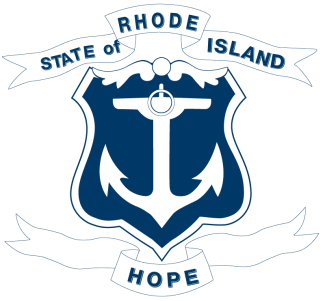
Administrator, Rehabilitation Unit
Kayla Villegas
Email: kayla.villegas@dlt.ri.gov
Arrigan Center
249 Blackstone Boulevard
Providence, RI 02906
Online
Physician Referral Form
About
Originally known as the Curative Centre of Rhode Island, the center was created by legislation enacted in 1943 by then Governor J. Howard McGrath. Located on Blackstone Boulevard on the East Side of Providence, the original building, purchased in October 1943, was a three-story 35-room home. The Curative Centre was to have opened for business in February of 1945, but the first patient was not seen until April 21, 1945 because of difficulties in obtaining the necessary equipment during World War II.
The Curative Centre was the first-of-its-kind industrial rehabilitation facility working in conjunction with a state’s Workers’ Compensation agency. The Curative Centre was founded based on the firm belief of the State Department of Labor that the full resources of modern medicine should be available to those injured in industry.7 The purpose of the Centre remains the same: to provide rehabilitative services to individuals who have filed a workers’ compensation claim—that is, those who have developed an illness or suffered an injury in the course of employment. Governor McGrath pushed for establishment of the Curative Centre in his 1943 inaugural address. He stated, “I hope that this year may see progress made in the establishment of a Curative Centre for assistance to workers suffering from occupational injuries…our departmental studies have amply demonstrated that such a program can tremendously shorten periods of disability.” One of the expressed reasons for the creation of a center was to rehabilitate workers quickly to assist in the war effort.
Dr. John E. Donley, the center‘s first medical director, stated that the Curative Centre‘s unofficial motto was, “You can coax nature back to work but you cannot coerce her.” Dr. Donley led a staff of twelve that included an assistant director/orthopedic specialist, two physical therapists, two occupational therapists, a medical secretary, two general secretaries, and two field investigators (as well as a maintenance crew). The center originally provided three types of treatment: physical, occupational, and recreational therapy. In 1960, the rehabilitation program was expanded to include―counseling and guidance, work evaluation, conditioning for work, and vocational training. Following Dr. Donley‘s death in 1960, the Curative Centre was renamed in his honor. By 1969, the staff had grown to 22.
Another expansion of services occurred in 1983 with the addition of vocational counseling, psychological services, and English as a Second Language (ESL) classes. A physical expansion also took place that year with the construction of a new wing, which included among other things a therapeutic warm-water pool. By 1994, five types of therapy and services were offered and a satellite center—since closed—had been opened at the University of Rhode Island.
In July 2017, the Donley Center was renamed: The Chief Judge Robert F. Arrigan Rehabilitation Center, in honor of the first Chief Judge of the Rhode Island Workers’ Compensation Court. During his tenure, Chief Judge Arrigan worked tirelessly to transform a dysfunctional workers’ compensation system into an internationally recognized model of efficiency. He was passionate about his work and put the good of the system ahead of personal gain. He was also a staunch advocate for the rehabilitation of injured workers and the Donley Center.
The Arrigan Rehabilitation Center’s mission is to restore every Rhode Island injured worker to health, social independence, and optimal working capacity by providing a multidisciplinary level of care that is comprehensive in nature and administered by highly qualified, licensed, and compassionate staff. The center takes a holistic approach to rehabilitation based on a belief that an injured worker needs more than just physical/ occupational therapy to return to work. Currently, the center provides physical, aquatic, and occupational therapy, work hardening, comprehensive pain management, psychological counseling, support groups, educational workshops, vocational services, job placement assistance, and re-training programs through the RI Department of Labor and Training Workforce Development.
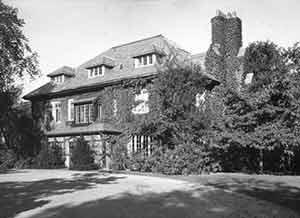
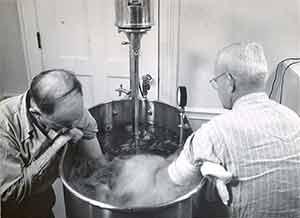

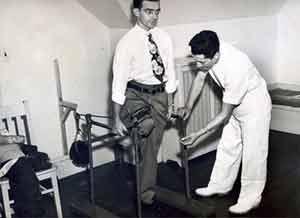
John Edward Donley, M.D.
(1870 – 1960)
A lifelong Rhode Island resident, Dr. Donley attended elementary and high school in Providence, R.I., graduating from Classical High School. He then attended Seton Hall College where he graduated in 1897 with an A.B. and continued his graduate work there, attaining his A.M. in 1899. Dr. Donley enrolled in medical school at the University of Pennsylvania, completing his program in 1902 and post-doctorate work in psychiatry in 1904. Upon completion of his program, he moved back to Providence, R.I. and began his specialist work as a neuropsychiatrist, with research interests in nervous and mental diseases/disorders.
Dr. Donley was a dedicated practitioner, researcher, and scholar. He is recognized as a pioneer in the field of clinical hypnoidization and hypnosis in the treatment of mental disease/disorders. Additionally, he was a strong advocate for individuals with disabilities. In 1953, President Dwight D. Eisenhower recognized him for his “outstanding service to the disabled in Rhode Island.”
Dr. Donley was a dedicated practitioner, researcher, and scholar. He is recognized as a pioneer in the field of clinical hypnoidization and hypnosis in the treatment of mental disease/disorders. Additionally, he was a strong advocate for individuals with disabilities. In 1953, President Dwight D. Eisenhower recognized him for his “outstanding service to the disabled in Rhode Island.”
He was the recipient of Honorary Degrees in Law from Seton Hall University and Providence College for his outstanding work in medicine. He was the keynote speaker at Providence College’s 2nd Commencement. In 1943, Governor J. Howard McGrath appointed him as the first Medical Director of the Curative Centre of Rhode Island. Under the direction of Dr. Donley, the Curative Centre of Rhode Island was recognized as a worldwide model in the treatment and care of injured workers.
In September 1960, at the time of his passing, the Rhode Island Medical Society dedicated an issue of their Journal in honor of Dr. Donley, stating: “Dr. Donley was not only a gentleman and a scholar, but he was also a man who could view his patients with compassion and understanding that not only endeared him to them but greatly enhanced the help which he could give them. The Journal is proud of his career as a neuropsychiatrist, and of his attainments as a student of the classics, and of the honors that have been awarded to him. Although he is no more its leader, the Journal in its work will long feel the influence of his wisdom, his judgment, and his kindly spirit, which will be a lasting impression to those who carry on in the years to come.”
Proudly in 1961, the Curative Centre of Rhode Island was renamed in his honor, as the Dr. John E. Donley Rehabilitation Center. Dr. Donley left an indelible legacy to the medical field as well as to the treatment of injured workers.
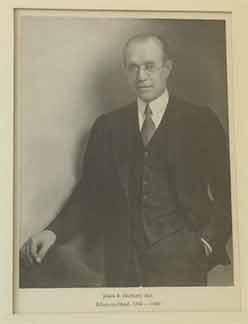
Honorable Robert F. Arrigan
(February 7, 1933 - December 26, 2013)
Robert F. Arrigan was a lifelong resident of Rhode Island, having attended Providence public schools, and graduating from La Salle Academy in 1951. He attended Providence College from where he graduated in 1957. As a Captain in the U.S. Army Reserves and having attended the U.S. Army Air Defense School, he proudly served his country. From Georgetown University Law School, he completed his Juris Doctorate in 1961. He was admitted to the Rhode Island Bar in 1961 and the United States District Court, District of Rhode Island in 1969. From 1975 to 1978, he was a Providence Municipal Court Judge.
Judge Arrigan was appointed Commissioner of the Rhode Island Workers’ Compensation Commission by Governor J. Joseph Garrahy in 1978 and Vice-Chairman in 1984. He spearheaded the effort to transform the Commission to a Court and was appointed its first Chief Judge by Governor Bruce Sundlun in 1990. He served in this position until his retirement in 2003.
During the course of his service as Chief, Judge Arrigan worked tirelessly to transform a dysfunctional workers’ compensation system into an internationally recognized model of efficiency. As Chief Judge, he set out to energize and reform the court process. He worked closely with now Senator Sheldon Whitehouse, members of Labor, the General Assembly, and Governor Sundlun to overhaul the entire workers’ compensation system in Rhode Island to include changes in the law, court procedures, and the administration of justice. He led the effort to implement these changes, helping to make the system what it is today. Part of this included the creation and oversight of the Workers’ Compensation Advisory Council and the Workers’ Compensation Medical Advisory Board. Under his direction, the Medical Advisory Board began preparing protocols for treatment of the most common injuries. These protocols are frequently cited as national models for the treatment of work-related injuries.
Chief Judge Arrigan’s dedication included education and knowledge-sharing, both locally and nationally. He began the teaching of a course in workers’ compensation at Roger Williams University that continues to be a foundation for workers’ compensation professionals in Rhode Island. He became actively involved in the International Association of Industrial Accident Boards and Commissions, serving in many leadership roles until eventually becoming its president from 1997 to 1998.
All of these roles included educational meetings where workers’ compensation professionals from around the world shared ideas on how to better serve injured workers and also protect the best interests of their employers. Chief Judge Arrigan was also a trustee of the International Workers’ Compensation College.
Upon retirement, he served on the Board of the International Workers’ Compensation Foundation and continued to advance the study of efficient administration of workers’ compensation benefits, eventually receiving its lifetime achievement award.
Chief Judge Arrigan left a magnificent legacy. The citizens of the State of Rhode Island can remember him as a leader who saved the workers’ compensation system from collapse. His colleagues respected him as an indefatigable leader who endeavored to put the good of the system ahead of personal gain. Litigants who appeared before him will remember him for the boundless respect and care he brought to the bench. We therefore all owe Chief Judge Arrigan a substantial depth of gratitude.

Goal of The Arrigan Rehabilitation Center
“To restore every Rhode Island injured worker to health, social independence, and optimal working capacity by providing a multidisciplinary level of care that is comprehensive in nature and administered by highly qualified, licensed, and compassionate staff.”
How we serve the injured workers of Rhode Island
One of the most important Workers’ Compensation benefits provided by the Rhode Island Workers’ Compensation Act is the injured workers’ right to rehabilitation services as stated in Rhode Island General Law §28-33-41.
The Arrigan Rehabilitation Center provides services exclusively for employees injured in Rhode Island. The Center is committed to restoring injured workers to productive lives through advanced and effective methods of rehabilitation.
The Arrigan Center is unique in having assembled a multidisciplinary team of nurses, medical assistants, physical therapists, occupational therapists, physical therapy assistants, occupational therapy assistants, behavioral psychologists, social workers, vocational counselors, and physicians working together in one place. Together they provide comprehensive, individualized treatment programs that are essential for effective, successful, and efficient recovery. Rhode Island is the only state in the United States that offers this benefit.
Services
Physical/Occupational Therapy
The Arrigan Rehabilitation Center offers comprehensive physical and occupational therapy to assist injured workers who experience a variety of musculoskeletal and neurological concerns. Our highly qualified therapists evaluate the injured worker, create individualized treatment plans, assess progress, and supervise all treatments. Experienced in the industrial health setting, our physical and occupational therapy assistants directly provide our patients with many of the daily treatments.
The Center offers a spacious gym equipped with all necessary strengthening, conditioning, and flexibility equipment. The Center also possesses one of the largest therapy pools in Southern New England, which is 20 meters in length and has a constant temperature of 92 degrees F. Here we provide therapeutic aquatics with the aid of temperature, buoyancy, and the gentle but firm resistive force of water. This allows for strengthening and mobility training with greater ease and less discomfort.
Many of our injured workers receive a combination of therapeutic aquatics with either land-based therapeutic exercise/conditioning/mobility training or work hardening.
Our staff now also includes three Certified Hand Therapists who can treat acute hand injuries/post-op patients, administer therapeutic exercises, fabricate splints, and make recommendations for additional adaptive equipment.
All treatment staff are experienced in the treatment of work-related injuries, and participate in annual professional development and continuing education seminars. Many of our therapists present at local and national conferences. Also, some of our therapists supervise internships for physical and occupational therapy students from local colleges and universities, such as The University of Rhode Island, The Community College of Rhode Island, and The New England Institute of Technology.
Functional Capacity Evaluations
A Functional Capacity Evaluation (FCE) is a specialized test to assess an individual’s ability to safely perform activities as they relate to their present, former, and/or future employment. Essentially, a FCE is a measurement of an individual’s ability to perform work-related movements and/or tasks of the job, such as lifting; carrying; pushing; pulling; reaching; handling; climbing ladders, etc. The FCE measures both capacity and tolerance, including strength, endurance, speed, flexibility, and physical effort.
Roy and Leonard Matheson are considered to be the founding fathers of Rehabilitative Industrial Medicine in the United States. Their principles and practices have been implemented at The Arrigan Center for over 25 years. Roy Matheson has deemed our center as “one of the two premier workers’ compensation rehabilitation facilities in North America” (the other being in British Columbia, Canada).
Injured workers can be referred to The Arrigan Center for a Functional Capacity Evaluation by their treating physicians or by the Workers’ Compensation Court. A full evaluation may take up to several (three to four) hours to complete, and typically consists of four components:
Part 1 – The Interview: The injured worker will first meet with one of our Case Managers to determine the presence of any secondary medical concerns that could adversely affect the health and safety of the injured worker during the FCE. A physical or occupational therapist will then meet with the injured worker to gather information from the patient regarding their understanding of their injury, recovery, perception of their ability to return to work, and to identify any possible barriers to return to work. An accurate description of the essential job demands is gathered from the employer and the injured worker, which is a critical component in accurate test construction.
Part 2 – The Clinical Evaluation: The physical/occupational therapist conducts a full evaluation of the injured worker, measuring their strength, flexibility, reflexes, sensation, and range of motion.
Part 3 – The Functional Assessment: The injured worker is asked to perform a variety of essential job demands, such as walking, bending, lifting, carrying weights, and climbing stairs/ladders. These activities vary for each worker, and are based upon the individual’s diagnosis and information relating to their specific job requirements. The therapist introduces all of the activities at a baseline level, and makes gradual increases while monitoring the injured worker’s response.
Part 4 – Review Test Results and Recommendations: The therapist will report anatomical findings, functional performance as it relates to the essential job demands, and identify any apparent barriers to performance, such as fatigue, pain, insufficient strength, and effort. The test results will show if any gaps exist between the job requirements and the injured worker’s capabilities. If the injured worker has not demonstrated function at the full duty level, the therapist can make recommendations regarding the need for additional treatment that may enable the injured worker to improve function and return to work full duty. If additional treatment is not likely to produce an increase in function, the FCE results identify the level at which the injured worker can safely return to work, and note any restrictions or accommodations needed.
Testing can be stopped at any time at the request of the injured worker. If the therapist believes that the injured worker is in no danger of injury, they will encourage him/her to attempt to perform the task. If the injured worker continues to feel reluctant, and declines to perform the task(s), the therapist will terminate the testing. If the therapist evaluates the injured worker and feels that he/she may be approaching an unsafe level of exertion, the therapist will stop the testing.
A formal FCE report that summarizes the injured worker’s work performance is submitted to their physician, attorney (if applicable), insurer, and/or the court.
Rehabilitation Psychology
Psychological Counseling is available to assist injured workers in addressing issues arising from their injury that have added distress, so they do not pose barriers to recovery from their injury. These issues might include financial hardship, loss of independence, pain, domestic challenges, sleep disturbance, and fear. In short-term counseling, a licensed psychologist or clinical social worker will help the injured worker understand and cope with these difficulties – in either a private/one-on-one or group setting. Cognitive behavioral therapy provides a theoretical framework for counseling. In cases of traumatic injury, specialized treatment strategies can be used to help the injured worker overcome emotional sequalae of the trauma and be prepared to resume gainful employment. To learn the details about our comprehensive pain management program, please open this link to read about it.
Walking is an easy way to stay physically active, it can be done almost anywhere and it’s free! Sign up for the Own Your Health Walk with Ease Program to keep you accountable – it’s the first step toward a better life filled with more energy, less pain, and more opportunities to say “yes” to what you love in life! Walk with Ease is a free, six-week walking program that anyone of any age and physical fitness level can participate in! It has been proven effective in improving balance, reducing pain, improving mental health, flexibility, and overall physical health. Register today by visiting www.startwalkwithease.org/ridoh
The Chronic Pain Self-Management Program is a free 6-week workshop that equips participants with the tools needed to manage pain. Relaxation techniques, action plans, and pacing activity and rest are a few of the methods discussed in this group-based program. Classes are highly participative, where mutual support and success build the participants’ confidence in their ability to manage their health and maintain active and fulfilling lives. To find a program today visit www.ripin.org/chn/
Chronic Pain Programs
The Arrigan Rehabilitation Center offers two Pain Management Treatment Programs. For many years, we have offered a Comprehensive Pain Management Program that is an integrated program of physical/occupational therapy, psychological counseling, and vocational services when appropriate. This program focuses on pain self-management based upon a biopsychosocial (body/mind) approach. It does not include interventional pain management. The goals of this program are to learn effective coping strategies and behavioral skills to function safely (given objective medical findings), and to reduce the distress associated with having pain. In this context, pain management does not mean pain relief, but rather amelioration of suffering, and improved function and quality of life, as well as being prepared to return to the workforce.
Specific content is covered focusing on the development of pain management skills
- Education to better understand pain
- Relaxation training and mindfulness training
- Exercises to reduce negative tension (bracing; guarding; postural compensation)
- Goal-setting, pacing, and building activity tolerance
- Identification, challenging, and re-framing of maladaptive beliefs about pain
- Functional activity in gym or work hardening area to reduce fear, increase confidence, and establish a level consistent with work requirements
- Problem-solving
- Assertiveness
At the conclusion of the program, recommendations are made to the referring physicians regarding their patients’ functional level and a coordination of return to work (RTW) when the release is obtained, if their previous job is available. Vocational services are integrated into the program and help the injured workers return to the workforce if a release is obtained but a job is not available. For further details, please read the overview of our comprehensive pain management program.
Injured workers are admitted to this program either via court order or through a referral from their treating physician.
In March 2014, we began a new program in collaboration with The Rhode Island Workers’ Compensation Court, called the Interdisciplinary Chronic Pain Management Program. The focus of this program is essentially the same as that of the Comprehensive Pain Management Program; however, the distinction between this program and the Comprehensive Pain Management Program is that Arrigan Center staff can make recommendations back to the court for consideration of referral(s) to outside pain management medical providers (e.g., chiropractors; massage therapists; addiction specialists; acupuncturists) who would work with the Arrigan Center staff in an integrated treatment program for the injured worker. Candidates for the Interdisciplinary Chronic Pain Management Program will be admitted only by order from The Rhode Island Workers’ Compensation Court.
The Arrigan Rehabilitation Center’s Cognitive Recovery Program (aka COG) is designed to restore and improve cognitive, behavioral, emotional, physical and occupational functioning after a work-related injury and/or illness. This program is designed for patients with complex injuries resulting from motor vehicle accidents, mild traumatic brain injuries, assaults/physical altercations, cervical injuries with persistent headaches and illness such as post-acute sequelae of COVID-19 or Long COVID.
Patients will first be evaluated by an Occupational Therapist and Physical Therapist. After these evaluations, a customized plan of care will be enacted with each patient. These plans can consist of functional based cognitive rehabilitation, skilled physiotherapy, land and aquatic physical therapy, massage therapy, counseling, and vocational rehabilitation. The complete arsenal of services offered by the Arrigan Center will be available for these patients. The goal of this program is to achieve maximum cognitive and occupational recovery.
Vocational Recovery Services
“Return to work plays a significant role in the health and recovery of the individual, the reduction of disability, and the improvement of productivity and security. It also mitigates significant costs to employers, taxpayers, and society as a whole.” (IAIABC, 2016).
Vocational Recovery Services fulfill the Rhode Island General Law (RIGL) § 28-33-41 – Rehabilitation of Injured Persons by providing high quality vocational restorative and re-employment services to injured workers who cannot return to work in their job of injury or have been terminated by their employer by exceeding the period of time allotted under R.I.G.L. § 28-33-47 – Reinstatement of Injured Worker.
Vocational Recovery can take a variety of forms. Initially, a vocational counselor will meet face-to-face with an injured worker and conduct an intake assessment according to the Rhode Island Workers’ Compensation Court Medical Advisory Board’s Initial Vocational Assessment Protocol Guidelines. At the conclusion of this assessment, the counselor will make return-to-work recommendations. The bases of these recommendations emanate from the Rhode Island Workers’ Compensation Court, Medical Advisory Board’s Hierarchy of Vocational Rehabilitation. For example, if an injured worker is eligible to return to work with his/her employer, a vocational counselor will attempt to discuss (and can negotiate) his/her return to work by suggesting that an employer make accommodation(s) to the job so he/she can return to work despite some continuing disability. If it is not possible for an injured worker to return to work with his/her employer, the vocational counselor will recommend re-employment services and, if indicated, locate training opportunities.
Vocational counselors at the Arrigan Rehabilitation Center are trained and skilled in the rehabilitation of injured workers. Each vocational counselor has earned or is in the process of earning a Master’s Degree in Rehabilitation Counseling, is a Qualified Rehabilitation Counselor by the R.I. Department of Labor and Training, and has attained or is in the process of attaining the designation of Certified Rehabilitation Counselor by the Commission on Rehabilitation Counselor Certification. Graduate level rehabilitation counseling interns are often utilized from Salve Regina University, Assumption College, and the University of Massachusetts/Boston.
In 2017, the Department launched the Worker Recovery Program, a collaboration between the Arrigan Rehabilitation Center, Vocational Recovery Program, Workforce Development, DLT Career Centers, and Disability Employment Initiative (DEI). This partnership allows injured workers to attain re-employment and re-training services at one of five locations throughout Rhode Island.
Services consist (at the Arrigan Center) of an initial vocational evaluation and (at the DLT Career Center) access to monthly support groups and computer classes, career counseling with assignment of a career counselor, vocational testing, resumé and cover letter development, interview skills training, employment application workshops, job search workshops, job placement, access to job fairs and employer placement opportunities, access to Social Security benefits counseling, case management, and potential access to on-the-job training and retraining programs.
Links to training programs offered are:
To sign up for this program and/or to speak with a vocational counselor, please call (401) 243-1200 and select option # 6 at the voice prompt
Source: IAIABC Return to Work: A foundational approach to return to function. Disability and Return to Work Committee, IAIABC.
Rehabilitation counselors who provide service in rehabilitation plans must be certified by the Director. The Director has developed rules and regulations in accordance with RI General Laws for the the certification of rehabilitation counselors. There is a registration fee of $50.00 for each two-year certification. Certification of rehabilitation counselors is covered by Section 28-33-41 (f) of the RI General Laws. Scroll to the end of Section 41 to see subsection (f).
Patient Resources
Preparing For Your First Appointment
The first appointment allows treatment staff to gather vital information on an injured worker’s medical history and current medical issue(s). To expedite the registration process and reduce waiting time in the reception area, we request that all new patients follow our First Appointment Checklist.
First Appointment Checklist – please bring in:
- Valid photo ID, such as a state driver’s license, state-issued ID card, and/or passport
- Medical records pertaining to the injury (copies will be made and the originals will be given back)
- Patient Intake forms will be provided upon scheduling
Cancellations
To cancel or reschedule an appointment, please contact the center at 401-243-1200, option # 3. Please try to give notice at least one day in advance so that the open appointment time can be allocated to another injured worker.
No-Show Appointments
Admission to the Arrigan Rehabilitation Center enables an injured worker to take direct steps toward recovery from his/her work-related injury. We need to emphasize that if treatment sessions are missed, progress is likely to be hindered. When an injured worker does not show up for a confirmed appointment, all parties (medical provider, insurer, TPA, attorney, etc.) are notified by a written missed appointment letter.